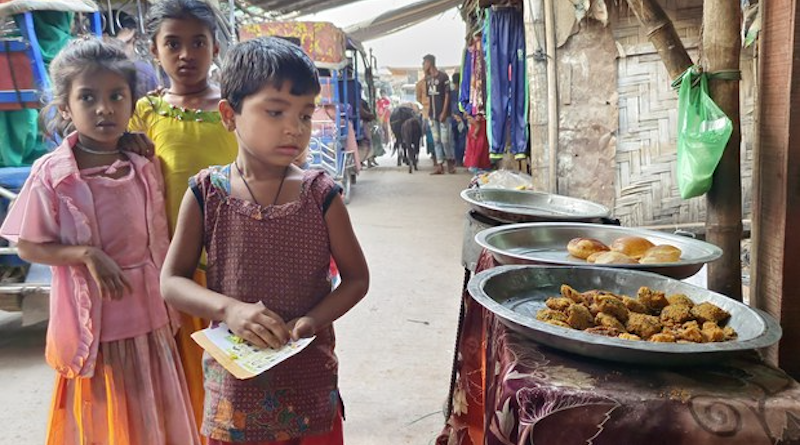Funding Crisis Threatens Fate Of Millions Of Rohingyas In Bangladesh: What Could Be An Alternative? – OpEd
History has unequivocally documented a long period of dominance, subjugation, exploitation, and social strife between the Buddhist and the Rohinyga community in Myanmar. As of September 2023, Bangladesh and UNHCR have registered 965,467 Rohingya refugees, half of whom are girls and women.
As Bangladesh enters its seventh year of the Rohingya influx incident, the host community is currently grappling with serious obstacles such as crime and drug incidents, uncontrolled population growth among the Rohingyas, severe environmental damages in the forest lands, price hikes of essential commodities, higher unemployment, and many more. Their prospects for a better future and healthy life seem progressively grim.
During the coup of 2021, the military officers responsible for expelling the Muslim minority from Rakhine State in 2016-2017 were subsequently promoted to crucial positions of government in Myanmar. Despite its insistence on initiating repatriation, the regime has declined to confer citizenship upon individuals who choose to return.
Concurrently, the Arakan Army, an ethnic armed faction advocating for increased self-governance for the Rakhine Buddhist majority and presently exerting control over a significant portion of the state’s central and northern regions, is gaining strength, thereby exacerbating the complexity of the situation in Rakhine State. Events such as the COVID-19 pandemic, the conflict between Russia and Ukraine, and the Palestine issues have redirected global focus, resulting in a financial crisis concerning the allocation of aid to displaced populations here in Bangladesh. This, in turn, poses setbacks to ensure the sustainable development of the more than one million Rohingyas currently residing in Cox’s Bazar and Bhasan Char.
To protect the dignity of the “most persecuted minority” of our time, the international community must continue to support Bangladesh, one of the largest refugee hosting countries, until repatriation becomes practical. According to a report by the think tank Center for Policy Dialogue (CPD) in Bangladesh, Bangladesh had to spend approximately $1.22 billion annually on Rohingya refugees. This amount is expected to rise due to population growth, rising inflation, and a decrease in foreign aid.
The CPD estimates that in order to provide housing and other humanitarian assistance to the Rohingya refugees for the first five years without repatriation, about $7 billion would be needed. The deficit is particularly significant in the year 2023, with the funding allocated to the Rohingya Humanitarian Crisis Joint Response Plan standing at only 40 percent. As a result, the United Nations has had to decrease food assistance by one third.
The World Food Programme (WFP) had to reduce the monthly rations for the entire Rohingya population in Cox’s Bazar in 2023. The amount decreased from US$12 per person to US$10 in March and further to US$8 in June. Based on the latest monitoring conducted by the WFP and its humanitarian partners, more than 15% of young children are experiencing malnutrition, and an alarming 90% of the population lacks access to a nutritious diet. The UN and international NGOs have been forced to end the employment of refugees in paid volunteer positions.
But keeping global politics in mind while preparing for repatriation, we must consider what else can be done. The United Nations should lead the charge in mobilizing international donors to address the financial burden by emphasizing how it could exacerbate the situation and lead to a severe human rights crisis. Honorable Prime Minister of Bangladesh, Sheikh Hasina has urged the United Nations Development Programme (UNDP) to take initiatives for creating a large international fund to help the Rohingyas.
The issue is also of concern to our development partners, who have expressed their views on the need for longer-term commitments and investments between parties involved in order to establish robust support for the Rohingyas. Additional to that, the cooperation of the global and regional leaders on this issue should be given immense priority by the diplomats, political executives and human rights activists and their combined role is deemed necessary in this regard.
The utmost use of the allocated funds, sustainable local infrastructure development, tightened security for the migrants should be emphasized so that greater efficiency could be achieved. Arranging primary education, language proficiency, and skill development training on a large scale for the Rohingya population in camps will open livelihood possibilities for them, reducing their reliance on aid and enabling them to become skilled workers for the future. Moreover, Facilitating the setting up of formal market linkages between host community and Rohingyas has the potential to significantly enhance social cohesion which ultimately reduce the crime rate and economic issues for them.

